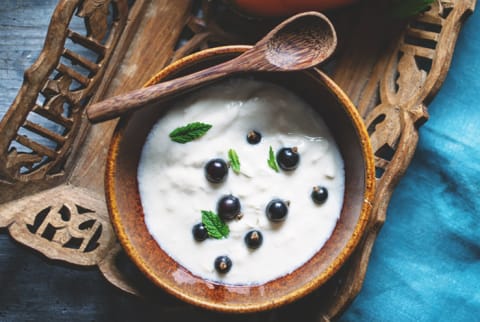Advertisement
Why You Should Probably Eat More Fermented Dairy


Fermenting has been around for thousands of years, and traditional cultures, including some in Russia and Europe, still rely on it heavily.
Once Americans enthusiastically embraced pasteurized dairy products over raw or fermented forms during the early 20th century, we lost a lot of powerful, immunizing probiotics and enzymes along with any potential pathogens.
Which is a bummer since fermentation can make food that was once inedible or even dangerous edible and nutritious.
Among the most popular fermented foods are dairy, sometimes referred to as cultured dairy. Fermentation increases the shelf life of dairy products, making them far tastier and a whole lot easier to digest.
Raw milk is fermented either by allowing it to sour naturally or by adding the milk-loving bacteria lactobacillus to it. Lactobacilli, generally benign and occurring naturally in small amounts in our gut, feed on the sugar and starch in the milk, creating lactic acid and preserving the milk in the process. They also zap bad bacteria and release beneficial enzymes, vitamins, minerals, omega-3 fatty acids, and various strains of fabulous probiotics. Here are a few more benefits to fermented dairy:
1. Fermentation eats up the sugar lactose.
Good news for anyone who’s lactose-intolerant or opts for a lower-carb diet. Since labels are made before fermentation, fermented dairy actually has fewer carbs than you see on the label.
2. Fermenting dairy products also improves their nutritional content, digestibility, and ability to detoxify.
It does this by preserving the enzymes lactase and lipase, which help you absorb more of fermented dairy’s nutrients. Fermenting dairy also tends to increase B vitamins while boosting the detoxifying powerhouse amino acid glutathione and many essential amino acids, and, of course, probiotics, the healthy bacteria in your gut.
Probiotics balance your gut ecosystem and earn fermented dairy a gold-star reputation for improving digestion and strengthening immunity.
If you aren’t dairy-intolerant, a little raw, grass-fed, fermented dairy becomes super healthy. You don’t always have to have all three, but check off as many of those boxes as you can. It will allow you to enjoy the richness of dairy again without the guilt, or the proteins and sugars that make you suffer with the symptoms of intolerance and fat gain.
Here are some of my favorites:
Yogurt: probably the most-consumed fermented dairy product, and for good reason — studies show its effectiveness in promoting a healthy digestive tract, especially in children. Try stirring plain, unsweetened Greek yogurt with frozen blueberries for a healthy, low-sugar impact treat.
Kefir: This drinkable yogurt comes from cow, goat, or sheep milk and contains many strains of healthy bacteria with numerous health benefits. Kefir’s other benefits include high levels of vitamin B12, calcium, magnesium, vitamin K2, biotin, folate, enzymes, and probiotics. Studies currently explore these health benefits, many with promising results.
Milk cheese: This is cheese made with milk that hasn’t been pasteurized — goat milk, sheep milk, and cow milk, which contain high amounts of the strains thermophillus, bifudus, bulgaricus, and acidophilus. Studies discuss the potential of these probiotic strains in raw milk cheeses to improve neurological issues, digestive health, and immunity.
Even people who react to dairy can often eat some of these foods, especially the nutrient powerhouse grass-fed ghee. It doesn’t have any dairy protein particles, so it’s safe even if (like me) you’re dairy intolerant.
Do you regularly incorporate fermented dairy or other foods into your diet? Do you keep up with the ever-growing benefits of probiotics? Share your favorite fermented food below.
Photo courtesy of Stocksy

JJ Virgin, CNS, BCHN, is a celebrity nutrition and fitness expert who helps clients lose weight fast by breaking free from food intolerance. A certified nutrition specialist, board certified Holistic Nutritionist, and Certified Exercise Physiologist, she is the author of the New York Times best-sellers The Virgin Diet: Drop 7 Foods, Lose 7 Pounds, Just 7 Days and The Virgin Diet Cookbook: 150 Easy and Delicious Recipes to Lose Weight and Feel Better Fast.
More from the author:
Functional Nutrition Training
Check out Functional Nutrition Coaching
A cutting-edge nutrition deep dive taught by 20+ top health & wellness experts
Learn moreMore from the author:
Functional Nutrition Training
Check out Functional Nutrition Coaching
A cutting-edge nutrition deep dive taught by 20+ top health & wellness experts
Learn more
JJ Virgin, CNS, BCHN, is a celebrity nutrition and fitness expert who helps clients lose weight fast by breaking free from food intolerance. A certified nutrition specialist, board certified Holistic Nutritionist, and Certified Exercise Physiologist, she is the author of the New York Times best-sellers The Virgin Diet: Drop 7 Foods, Lose 7 Pounds, Just 7 Days and The Virgin Diet Cookbook: 150 Easy and Delicious Recipes to Lose Weight and Feel Better Fast.